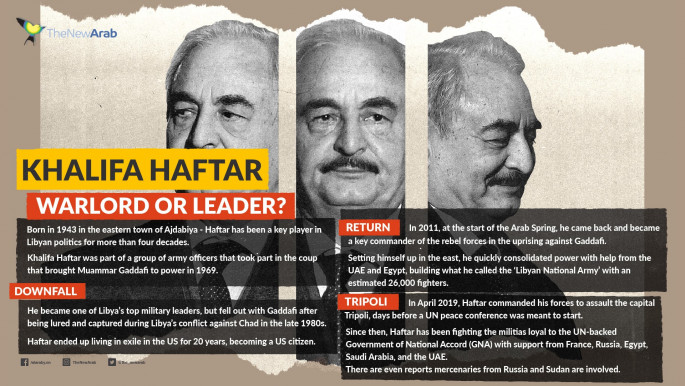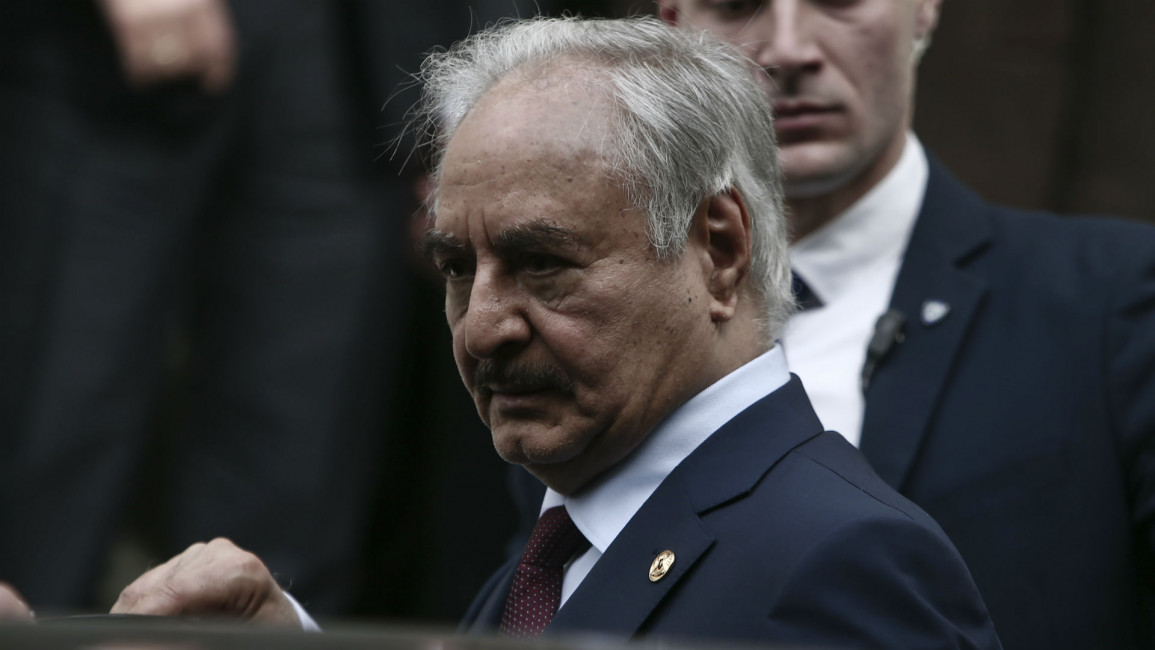UAE and Libya's Haftar sued in US for alleged 'war crimes'
The lawsuit was filed at a federal US court Monday and seeks $1 billion in damages, according to a news release by the plaintiffs' attorneys, Martin F. McMahon & Associates.
The families have been directly affected by war crimes in Libya, including the murder of their relatives, injuries or attempted killings.
"By filing the lawsuit in Washington, the plaintiffs will bring to light the serious human rights abuses, extrajudicial killings and torture which the defendants have engaged in with absolute impunity and without fear of accountability," said the release.
Haftar is "not just a war criminal, but also a US citizen with assets and family members" in the US.
"He can and will be held accountable for his illegal and barbaric acts", McMahon stated in the release.
Libya has been mired in chaos since the 2011 overthrow of longtime dictator Muammar Gaddafi, with rival administrations and militias vying for power.
The conflict deepened last April when Haftar, whose forces control much of Libya's south and east, launched an assault to seize Tripoli from the UN-recognised Government of National Accord (GNA).
The conflict has drawn a range of international players into the fray, including Turkey, which has backed the Tripoli-based GNA, while Haftar has support from Russia, the UAE and Egypt.
Last month, Turkish President Recep Tayyip Erdogan condemned Abu Dhabi over its involvement in the Libyan war, alleging that the emirate finances Russian mercenaries fighting on behalf of rogue General Khalifa Haftar.
Mohammad bin Zayed, Abu Dhabi crown prince and de-facto leader of the UAE, has become a regional rival of Erdogan's in recent years, backing Haftar's self-styled Libyan National Army (LNA) against the internationally recognised Government of National Accord (GNA).
Twitter Post
|
In a rare direct attack on the emirate, the Turkish president said Abu Dhabi had paid thousands to send Russian mercenaries to fight alongside Haftar's forces, Bloomberg reported.
Turkey is monitoring Haftar's "ugly attempts" to take more land despite the truce but will do whatever is necessary to stop him, Erdogan said.
"Haftar is, at the moment, like a desert lord in Libya," he told reporters. "He has control in desert areas but not in populated regions."
Abu Dhabi and Ankara are both accused of breaking a United Nations arms embargo on Libya in support of the warring parties.
In recent months, Turkey has mulled direct intervention in the conflict, threatening to send troops to assist Tripoli if Haftar does not stop his assault on the capital.
Earlier this month, Ankara dispatched military advisors to train forces loyal to the Tripoli government headed by Fayez Al-Sarraj.
 |
| [Click to enlarge] |
Erdogan has also reportedly assisted by deploying more than 2,000 Syrian rebels to fight alongside the internationally-recognised government. The Guardian reported the rebels have signed lucrative contacts with the Tripoli government, in addition to promises of Turkish citizenship.
Russia too has been accused of violating the arms embargo by shipping mercenaries from the Kremlin-backed private Wagner Group to fight alongside Haftar's forces.
Moscow has officially denied involvement but has not rejected claims of the mercenaries' presence in the conflict.
While it is unclear whether Erdogan's claims of Emirati financing of the Russian mercenaries are true, Abu Dhabi was last week accused of tricking Sudanese men to fight in the conflict.
Dozens of people protested outside the Emirati embassy in Khartoum recently, over allegations that a UAE-based security company was luring Sudanese men to the country under false pretences and forcing them into military training went viral.
After responding to an advertisement for security guards, the men are allegedly forced into a military training camp in the desert and then sent to fight in Libya or Yemen, local media reported.
Talks between representatives of Libya's warring parties in Geneva this week ended on Saturday with no deal on a ceasefire but the UN has proposed a second round of negotiations for 18 February.
The talks aim to end fighting between the UN-recognised government in Tripoli and eastern-based military commander Khalifa Haftar, the latest conflict to hit the North African state.
Follow us on Facebook, Twitter and Instagram to stay connected



